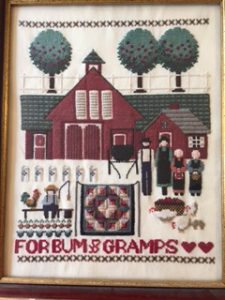Let’s see – for 10 years I commuted on buses, subways, or trains, at least two hours a day, 5 days a week, 48 weeks a year. That’s a total of 4800 hours going to and from medical school and then my job as a health policy analyst. So of course I leapt at the opportunity to “work from home,” ready to put my trove of found hours to good use.
It never occurred to me what I was sacrificing – my transitional time between work and home life. Commuting hours were not the idleness of a featureless day, but a segment of time all to myself, anonymous, agenda-less, with a built-in beginning and end. Belatedly I realized that my “found time” was actually my commute, the perfect guilt-free time to read, imagine and observe.
The New Yorker magazine was my frequent traveling companion. Those were the years that I could actually keep up with its weekly schedule. At home I lost my reading hour to the competing demands of two young children; New Yorkers began to pile up and I regretfully canceled my subscription. Crosswords puzzles or word games were acceptable options on the commute, but at home they seemed like indulgent guilty pleasures. Needlework was another favored activity. Once I noticed two other knitters in the same train car. We raised our needles to each other in silent acknowledgement. One fall I managed to complete a cross stitch of an entire Amish farm scene, complete with an itty bitty quilt hanging on the line and a row of apple trees. The lurching car made those little apples quite a challenge.
A crowded subway car was an ideal opportunity to observe and just let my mind drift among the welter of random strangers. The hospital subway line often stalled out in the same tunnel. I could feel the dankness settle in as germ-laden dust motes gently coated my face. I imagined that I might be trapped for days and wondered which passengers would become an “out-of-my-comfort zone” friend. Would it be the guy with a gold-plated razor blade necklace, or the stately older woman with bunions bulging through her worn sneakers, or the pregnant woman with her tongue in her boyfriends’ ear? I also realized that I was no catch. Often I arrived straight from the autopsy suite enveloped in the acrid odor of formaldehyde.
Sometimes the train would be so packed that only an isolated wedge of a passenger would be visible, like a small swatch of a woman’s plaid purse, an ugly thing with a garish yellow and brown tartan pattern. I concocted an entire story of a conflicted relationship built around that purse, imagining that the unseen woman hated it, but her husband insisted she carry it since it was a gift from her manipulative mother-in-law, who had probably given her the wretched purse as a loyalty test. The woman was heading to her in-law’s for dinner and planned to arrive gushing about the purse, but then sadly note that the zipper, which she had jimmied at work, was now broken. Depending on her mood, she might also announce, “You know, the zipper is often the first clue that something is a knock-off.”
Observing the etiquette of commuting, or the lack of it, was another entertaining mind game. On the crowded subway home, there were no rules, it was every man for himself, pushing, shoving, elbowing. I was an enthusiastic participant in this competitive sport, ready to weasel myself in the smallest nook available, unafraid to insist that people move to the center of the car, getting physical if necessary. I still consider it a personal triumph that I never had to wait for the next car.
In contrast the empty car presented a conundrum of etiquette options. On the way to work I would occasionally arrive on the subway platform at the same time as casual acquaintances, often neighbors. Should I sit next to them? I had no interest in exchanging pleasantries for the hour train ride, particularly with a crossword puzzle, New Yorker or other word game ready already selected, but would it be rude to deliberately sit by myself? I could pretend that I did not see my neighbors or slow up during my walk to the station, or turn my head on the platform, but these were potentially insulting artifices.
My preferred strategy was to get on the train first and sit down before anyone else. This placed the onus on the others to decide whether or not to snub me. Once I got on the train through the rear door, and panicked when two neighbors got on through the front. We met in the middle; there no time to take the first seat. They must also have been coveting their alone time. One said, “I have a book to read,” the other said, “I have some work to do.” Relieved we all took isolated seats. My uncle once invited me to join him in his private club car. He handled the situation with the ease of a 50 year plus commuter. As we sat next to each other the first words he said were, “What part of the paper would you like to read?” Alone together was a successful model for both of us.
If I took the train home instead of the subway, I could get on early and insure myself a seat, but I knew I would acquire a seat mate in a couple of stops. If I chose an empty row, who knows who would sit beside me? It could be a hacking cougher, a loud talker or someone eating a bag of greasy fries. Another option was to protect the adjacent seat. Recently this strategy has acquired the idiom “man-spreading.” Females can also spread their legs, but a more genteel strategy was put my purse on the adjacent seat. A little dab of water was also an effective deterrent. Knitting needles seemed to scare people, but on a crowded train eventually someone was going to sit next to me.
The alternative strategy was to accept the inevitable, take control and plop down next to a pleasant looking person even though empty rows were available. The psychological impact was interesting to observe; often the seat mate would squirm nervously, wondering if I was a stalker or had some other personality flaw. Of course, even the most agreeable-looking person could go sour. Once my seat mate started to brush her hair at the second stop. I could hear the brush scraping across her scalp. Soon my pastel skirt was veiled with a smattering of her pubic-style black hair. Then she cut her fingernails which zinged off in different directions. I saw at least one land on my skirt and I imagined that another ricocheted off my cheek.
The companion issue was whether or not it was in poor taste to move once another seat became available. I remember snagging the last seat in an overheated subway car using a smooth move akin to a football running back deking out an opponent. But my smug triumph evaporated as the car thinned out and I realized that my seat mate was appalling. He was a huge and hairy man overflowing the seat so that our thighs were not just touching at a single point, but all along their length. He wore a sickly-hued polyester shirt with yellowed armpits. His nostrils were cavernous with tiny drips of sweat dangling from his nose hairs. And yet somehow I felt that it would be disrespectful if I moved to a different seat. Slowly the entire car emptied, and for the last three stops we were the only two people on the train. But I stayed put, our thighs plastered together, trapped by some ridiculous notion of politeness to total strangers.
My favorite experience was the time I got on the train at the second stop. I knew that I would be lucky to get a seat, and as I stepped into the rear of the car, I saw only one vacant spot at the far end. I was immediately filled with misgivings. There were probably 100 people on this train car and every one had considered and rejected that seat. What was it about the person that scared people off? I could only see the backs of heads so I had few clues to go on. That man must be very unpleasant, I thought, maybe an aggressive man-spreader, perhaps poor hygiene or a splayed zipper. Swallowing hard, I decided to go for it and embrace the thrill of the commute. I burst out laughing in a mixture of relief and excitement when I realized the empty seat was next to my brother!
The missing words in the following poem are anagrams (i.e. share the same letters like spot, post, stop) and the number of asterisks indicates the number of letters. One of the missing words will rhyme with either the previous or following line. Your job is to solve the missing words based on the above rules and the context of the poem. Scroll down for answers.
As I get on the train, I try and find a relaxing and comfortable place to *** .
Avoiding the snorer, the gabber, the sweater, and the unkempt nose picking misfit.
But as I look down the car, I despair and see there no reason to rejoice,
*** too crowded – there is only one seat left so I really have no choice.
Who is this person that made everyone reject this seat and seek another,
So *** very surprising when I find the empty seat is next to my brother!
Follow Liza Blue on:Share:


